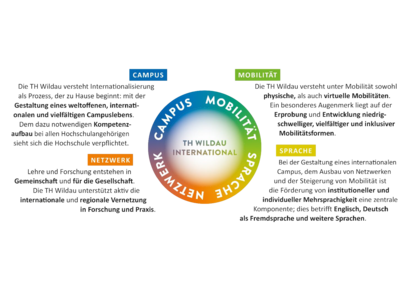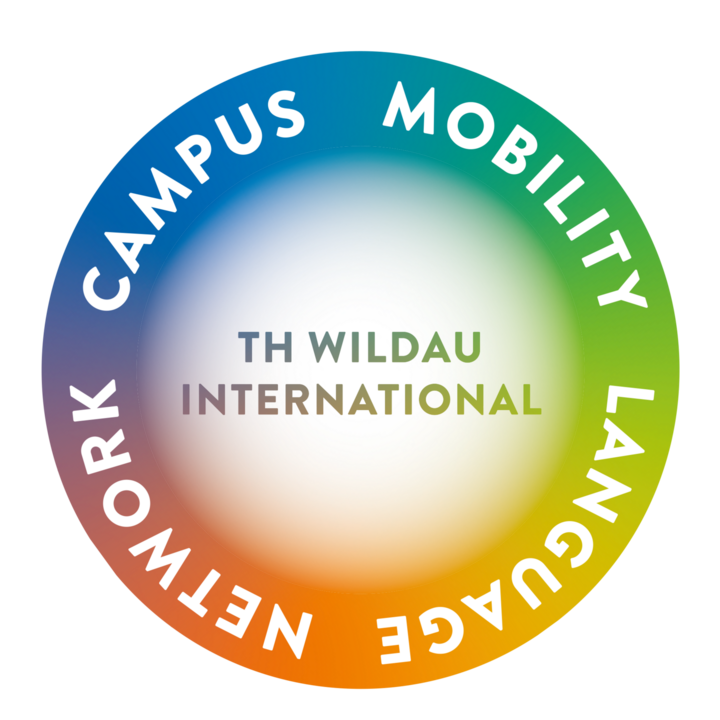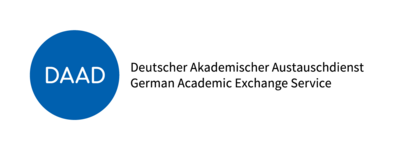TH Wildau is undergoing a comprehensive strategic process to position itself as a university vis-à-vis its competitors and to give itself a specific profile.
Based on the development of its mission statement in 2019, as well as the higher education contract and the higher education development plan, TH Wildau worked on the development of its first university-wide internationalisation strategy from 2020 to 2022. The strategy was developed as part of a participatory approach and was supported by all areas of the university. The TH Wildau Senate unanimously approved the internationalisation strategy on 04 July, 2022 (after prior endorsement in both departmental councils).
If you have any questions or suggestions, please feel free to contact the project team.
E-Mail-Adresse: international(at)th-wildau.de
TH Wildau Internationalisation Strategy
PreambleOpen areaClose area
Internationalisation is a central strategic goal in the development of TH Wildau. TH Wildau understands internationalisation as a cross-sectional task that encompasses all areas and all members of the university. Internationalisation serves to increase and secure quality in research, teaching, and transfer, and strengthens the competitiveness of the university and of Germany as an international hub for knowledge and science. Experiences with the pandemic in the past two years have clearly shown that we need close and systematic links between internationalisation, digitalization, and sustainability. TH Wildau is committed to consolidating these links.
Internationalisation is also an essential prerequisite for researching into and learning to deal with global societal challenges such as health crises, climate change, worldwide migration, and peacekeeping. TH Wildau reflects on the goals and conditions of specific cooperation projects and our selection of cooperation partners with regard to scientific freedoms and political contexts. We also strive to counteract existing inequalities and to contribute to scientific, economic, and social development.
Four fields of action as core areasOpen areaClose area

GoalsOpen areaClose area
Given these fields of action, TH Wildau has set itself the following goals:
Campus
- We support an international campus and consolidate our above-average proportion of international students at around 20%. We aim to increase the proportion of our international staff, especially our teaching and research staff, also to 20%.
- We promote the academic success of our international students based on their specific needs. We focus on quality-guided criteria in selection, evaluation, and support.
- We increase the international visibility of TH Wildau and develop a suitable communication and marketing concept for this purpose.
- We improve services and optimise administrative processes for international affairs.
Language
- We strategically develop our international study programmes and increase the number of (compulsory) English-language study modules.
- We develop an institutional language concept for all stakeholder groups and support its implementation.
- We take multilingualism and intercultural competences into account in the selection of new university staff and in staff promotions.
Networks
- We expand our networks for international research cooperation and promote the internationalisation of research staff.
- We identify strategic partnerships and continue the ongoing, quality-guided evaluation of all TH Wildau partnerships.
Mobility
- We enable all students and staff to have international experiences. We increase the number of international student mobilities and strive for mobility windows in all degree programmes.
- We promote bottom-up initiatives, striving to find international cooperation for all study programmes. A special focus of our activities is on the European higher education area.
From Idea to ImplementationOpen areaClose area
This internationalisation strategy was developed in 2020 and 2021 in a university-wide participatory process and supported by the German Rectors’ Conference Internationalisation of Higher Education Institutions compact audit, and by the DAAD HAW.International funding programme.
This internationalisation strategy takes into account the following reference and framework papers: University Contract, Higher Education Development Plans of the State of Brandenburg and TH Wildau, recommendations and position papers of the German Council of Science and Humanities, the German Rectors’ Conference, the DAAD, and the Federal Government, as well as TH Wildau internal strategy and mission statements.
The internationalization strategy was developed:
- taking into account the subject profile, the university location Wildau and the capital region Berlin-Brandenburg
- with the setting of regional and thematic priorities
- in a balance of scientific, economic and political goals
- in participatory mediation between top-down and bottom-up processes
- in the interplay between planned and emergent strategies
- underpinned by long-term human and financial resource planning
- in alignment with the Federal Government's internationalization strategy (2017), the strategy of the Joint Science Conference (2013) and the existing nationwide strategies for individual countries and regions (China, Africa, Europe)
- on the basis of values such as academic freedom, institutional autonomy, openness to the world, tolerance, cultural diversity, freedom of opinion, fairness and equality.
Strategy Commission on InternationalisationOpen areaClose area
TH Wildau’s internationalisation strategy is implemented with specific measures and is subject to ongoing monitoring by the Internationalisation Strategy Commission of the university Executive Board. The Strategy Commission reports to the Executive Board once a year. The internationalisation strategy is updated at regular intervals, starting in 2024 as part of the university’s central strategic documents (University Contract and University Development Plan).




